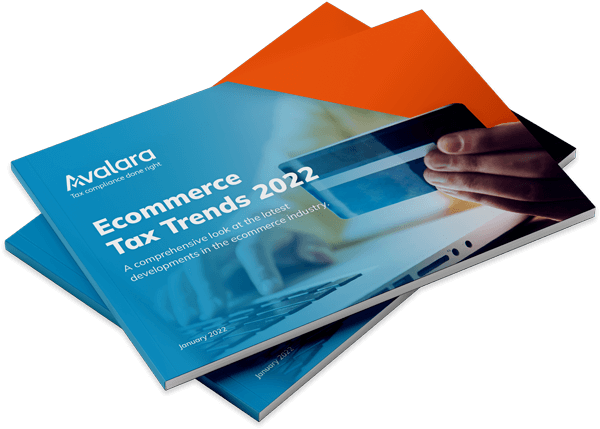
Incoterms in shipping and their impact on indirect tax
When selling across borders, businesses must consider how the items they’re selling, at what quantity and price, and the tax rules in the buyer’s country all have implications for their tax compliance. But how sellers actually move goods across borders can also impact VAT, GST, and import/export duties.
Incoterms establish freight, insurance, customs, and import/export duties responsibilities between buyers and sellers in international trade. The chosen Incoterm can affect when and where a taxable supply occurs, and whether a business must register for VAT in another country. Incoterms set out:
- Where the goods will be delivered
- Who is responsible for arranging transport
- Who handles and pays for insurance
- Who handles customs procedures and is the importer of record
- Who pays any customs duties and import VAT
Key takeaways
This article can help you understand:
- What Incoterms are
- Which Incoterms are best for your business
- How Avalara can help
What are Incoterms?
Incoterms is short for International Commercial Terms. Published by the International Chamber of Commerce (ICC), Incoterms are a set of globally recognised rules that define the responsibilities of buyers and sellers conducting cross-border trade.
Incoterms define:
- Who is responsible for transportation
- Who pays for shipping, insurance, and duties
- Where the risk transfers from seller to buyer
- Who handles customs clearance
Incoterms do not cover the sale price of goods or payment terms.
Modes of transport Incoterms
Modes of transport Incoterms are the rules that apply based on the type of transport used — whether any mode of transport (like air, road, rail, or multimodal) or sea and inland waterway transport only.
Ex Works (EXW)
Under EXW, the seller makes the goods available at their premises such as a factory, warehouse, or office. The buyer collects goods from the seller’s premises and is responsible for everything — transportation and insurance, export and import clearance, duties, loading at seller’s premises (unless agreed otherwise), and final delivery.
Free Carrier (FCA)
Under FCA, the seller delivers the goods to a named destination, such as a warehouse, shipping terminal, or a freight forwarder’s facility. Once the goods are handed over at one of these locations, risk and responsibility are transferred to the buyer. The seller is responsible for export customs clearance. The buyer is responsible for freight, import customs and duties, and unloading at the final destination.
Carrier and Insurance Paid To (CIP)
CIP is suitable for goods being delivered by multiple modes of transport, e.g., by lorry, ship, and rail. Under CIP, the seller delivers the goods to a carrier and pays for transportation and insurance to a named destination. However, risk transfers to the buyer as soon as the goods are handed over to the first carrier, not at the final destination. The seller is also responsible for export customs. The buyer is responsible for import customs and duties.
Carriage Paid To (CPT)
Like CIP, CPT is suitable for goods being delivered by multiple modes of transport, e.g., by lorry, ship, and rail. Under CPT, the seller delivers the goods to a carrier and pays for transportation to a named destination — but doesn’t cover insurance. Risk transfers to the buyer as soon as the goods are handed over to the first carrier, not at the final destination. The seller is also responsible for export customs. The buyer is responsible for import customs and duties.
Delivered at Place (DAP)
Under DAP, the seller delivers the goods to the buyer, but doesn’t cover import duties, taxes, or customs clearance. The buyer is responsible for import customs clearance, import VAT or GST, and unloading at the agreed final destination.
Delivered at Place Unloaded (DPU)
Under DPU, the seller delivers the goods to a named destination such as a warehouse or terminal and unloads them (DPU is the only Incoterm that requires the seller to unload the goods at the named destination). The seller also bears all risks and costs up to the point of delivery. The buyer is responsible for import clearance and customs duties.
Delivered Duty Paid (DDP)
Under DDP, the seller bears full responsibility for delivery to the buyer, and covers export duties, import duties, import VAT or GST, shipping and insurance, and customs clearance. The buyer’s only responsibility is to receive the goods.
Sea and inland waterway transport Incoterms
These Incoterms are best for bulk or non-containerised cargo. They’re less suitable for container shipping due to risk-transfer points.
Free Alongside Ship (FAS)
Under FAS, the seller delivers the goods to the named port of shipment but is not responsible for loading the goods onto the vessel. The seller is also not responsible for shipping or insurance beyond that point. Once the goods are alongside the ship, risk and cost transfer to the buyer, who is also responsible for loading the goods onto the vessel, insurance, main carriage, and import duties and clearance.
Free on Board (FOB)
Under FOB, the seller is responsible for delivering the goods on board the vessel at the named port of shipment. Once the goods are loaded onto the ship, the buyer takes over all further costs and risks, including freight, insurance, and import clearance and duties.
Cost and Freight (CFR)
Under CFR, the seller is responsible for delivering the goods on board the ship and paying the cost of freight to the destination port. However, risk transfers to the buyer once the goods are loaded onto the vessel, not at the final destination. The buyer is responsible for insurance and risk during main transit, as well as import duties and clearance.
CFR is often used with bulk commodities and is suitable for sellers that have access to affordable freight options.
Cost, Insurance and Freight (CIF)
Under CIF, the seller pays for the cost of transporting goods and minimum insurance to the destination port. The seller is also responsible for loading onto the ship, export customs clearance, and ocean freight to the destination port. Risk transfers to the buyer once the goods are loaded on board the vessel, and not upon arrival at the final destination. The buyer is responsible for import clearance, duties, and inland transport after arrival.
CIF is best for bulk and break-bulk — goods that are transported as individual units such as boxes, crates, or pallets — cargo. CIF is less suitable for containers.
Benefits of using Incoterms
Incoterms clearly define who is responsible for important factors of cross-border trade such as transport arrangements, customs clearance, taxes, and import duties.
By setting standard terms that are recognised globally, Incoterms help to reduce the risk of disputes between sellers and buyers and prevent misunderstandings about who is responsible for what and at what cost.
Incoterms can help businesses manage their tax compliance obligations by defining who is responsible for import and export VAT and GST and related documentation, customs declarations, and whether the seller must register for tax in the country of the buyer.
Incoterms and VAT
Incoterms affect how VAT is applied in international trade by shaping the logistics, legal ownership, and flow of goods. Incoterms can:
Determine the place of supply — VAT liability can depend on where goods are delivered. Incoterms define the delivery location, which helps determine the tax jurisdiction.
Establish who is the importer of record — Some Incoterms require the seller to act as importer, which means they may need to register for VAT in the buyer’s country. They could also be liable for import VAT and customs duties.
Trigger VAT registration requirements — Depending on the Incoterm used, the seller may be required to import goods in the customer’s country and/or store the goods locally, which may mean registering for VAT in that country is a requirement.
Impact VAT recovery — If one of the parties involved in the transaction is not the importer of record, they may not be able to reclaim import VAT.
Incoterms and customs
Incoterms affect customs by defining who is responsible for export and import clearance, duties, and documentation during cross-border transactions. Most Incoterms assign export clearance to the seller, but some — such as EXW — assign this responsibility to the buyer. The party responsible must provide invoices, certificates, and other customs paperwork. Incoterms also influence whether transport and insurance costs are included in the customs value used to calculate duties.
Speak with Avalara today about our compliance solutions and how they can help you.
You can also read about U.S. sales tax compliance when shipping into the U.S.
Incoterms FAQ
What’s not included in Incoterms I need to be aware of as a buyer?
Buyers should be aware that Incoterms are not a contract of sale and do not define obligations unrelated to delivery such as quality inspection and product liability. They do not cover or determine the price of goods, payment terms, payment method, or currency used. These are defined in the sales contract between the seller and the buyer. Though Incoterms define risk transfer, they do not cover transfer of ownership.
Which documents should Incoterms be featured on?
The key documents that should feature Incoterms include the commercial invoice, which should state the chosen Incoterm and the named place, the sales contract, the proforma invoice or quotation, and relevant transport documentation.
What does Incoterms mean?
‘Incoterms is short for International Commercial Terms’. Incoterms are a set of globally recognised rules that define the responsibilities of buyers and sellers involved in cross-border trade.
Stay up to date
Sign up today for our free newsletter and receive the latest indirect tax updates impacting businesses selling internationally straight to your inbox.




